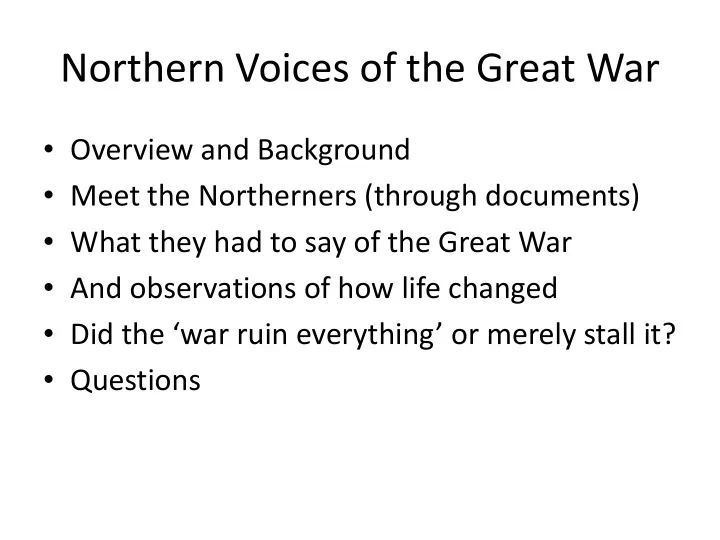

Northern Voices of the Great War • Overview and Background • Meet the Northerners (through documents) • What they had to say of the Great War • And observations of how life changed • Did the ‘war ruin everything’ or merely stall it? • Questions
• Conference Yk 2016 • Primary sources (letters, documents, government files, personal memoires) and archive oral interviews (I. Orchard) • Audio as an intimate and immediate experience – linking the past and present in ways text based research does not.
Northerners • Voices • Vicky (Morison Aldous) Simms daughter of Odille Morison and CFMorison, born in Metlakatla, (Port Essington/Hazelton) • married GTP surveyor real estate broker • Brother Jack and her husband enlisted in 1916/17 • War ruined lives (businesses bankrupt, so many people lost) • • Authur Shelford ( plus documents) Ootsa Lake Homestead (bro. Jack) • Enlisted 1916, walked to Hazelton Dr. Wrinch • 2 women nurses proposed and marries one • Population - Women increase by almost 12% in the census 1911 -1921 • • Bea Williscroft Teenager summers in Telkwa Describes the Remittance Men as first to enlist • Train ride and first causalities •
1960s “Living Memory” excerpt Orchard … Gradually their farm began to take shape. Then came the War. • Shelford “In 1916, I enlisted and went overseas. • The thing that amused me was the fact that when Dr. Wrinch Of Hazelton • examined me, he wanted to turn me down for flat feet. Well I said, ‘What does flat feet imply with regards to a soldier?” • He says, “You cannot march.” • “Well,” I said, “I walked 45 miles out to the railway in 24 hours to come out • here to enlist.” “Yes,” he said, “but you couldn’t walk the next day.” • No but I did manage to hobble 30 miles over the ties (or Tyee) to Telkwa. • He said, “Well, I guess I better pass ya.” • And to think, a man like myself couldn’t march with flat feet. • During the first year in our country (Lakes region) I walked over 1100 miles.
• Documents (Letters, Enlistment Papers, Obituary) • William Lowry (physical description) Letters detail homestead life, loneliness but also hardship as masculine vitality. • Dug ditches, canoed, trapped furs and built a cabin • No work, price of furs plummets (Hazelton newspaper confirm this) • Companionship of comrades as all able bodied men are expected to sign up • Nov. letter but still enlisted in January Mother’s permission (but still enlisted by January) • Letters of circular trip – needed for pay and treatment or face court martial for desertion • Rise in prices for food and basics. • – Bowron river to PG to Enlist then over to France, wounded within 6 months, severe burns to his face and • hands. The sent to England, a few weeks in Quebec and then Vancouver Island to convalesce. Eventually he returns to survey work NE BC at the close of the war. Dies at about 45 from wounds •
Document searches • http://www.canadianletters.ca/collections/468 http://www.bac- lac.gc.ca/eng/discover/military-heritage/first- world-war/personnel- records/Pages/search.aspx https://open.library.ubc.ca/collections/bcnew spapers
Lowry
Lowry death (1940) PG Citizen
Nurses and homelife Eva Hogan enlisted as • nurse • Hazelton paper notes she sends a memento back to her mother. German shrapnel helmet. • Marries Dr. Wrinch in later life
Mattie O’Neill Boss • Memories • Says the war ruined her husband’s realty business several brothers, friends went to war. Many did not return. • Volunteer women’s work (Red Cross laundry) • Sphagnum moss –train carloads of it • Indigenous women gatherers. .
Newspaper notes all the organizations and community efforts to raise money. At least 3 different agencies in Hazelton. Later this included the tobacco fund
Watch your step: • “Eat less bread “ is no nineday • catch phrase. It is a solemn enjoinder in sacrifice your appetite to your country’s need. Which would you rather do, eat your bread and let a soldier starve, or fulfill your duty to the people of the Allied world and made a destitute Belgian happy by making the loaf on the table last you a little longer? In the hands of the Canadian people rests the decision.”
• Demand for goods and products such as wheat – use less bread • Mining took a hit (explosives, labour) • Floyd Frank and lack of wool and cotton but the sitka spruce (new industries) • Labour shortages in the farms as conscription takes hold. • Demands for explosives mines closed • –
• So in conclusion • Vicky (MorisonAldous) Simms was correct • Ruined everything
Recommend
More recommend